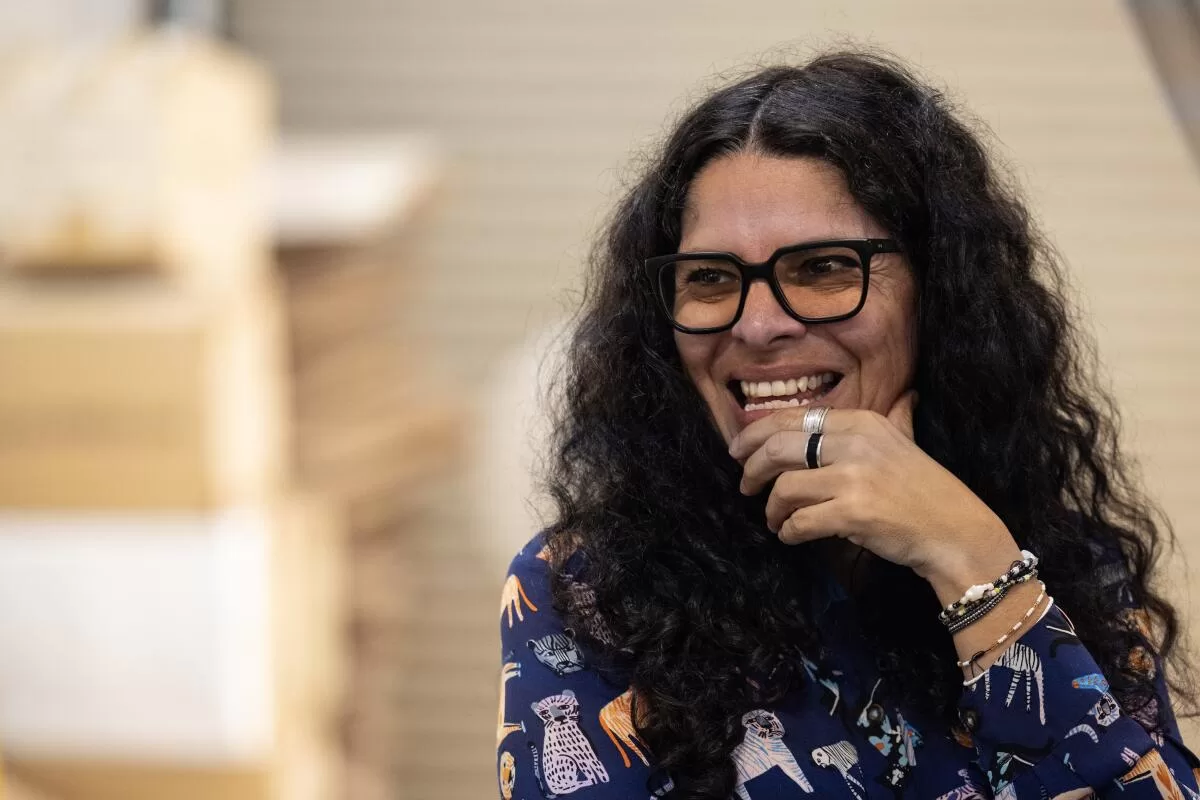As mothers with kids at Edison Language Academy in Santa Monica, they saw that the market for bilingual books for Latinos and non-Latinos alike was surging, especially as schools created dual immersion programs. As immigrants from Mexico and Spain, they knew that Spanish had been part of Southern California for over 250 years and wasn’t going to disappear anytime soon.
No, what made them fret was the eternal question Angelenos face:
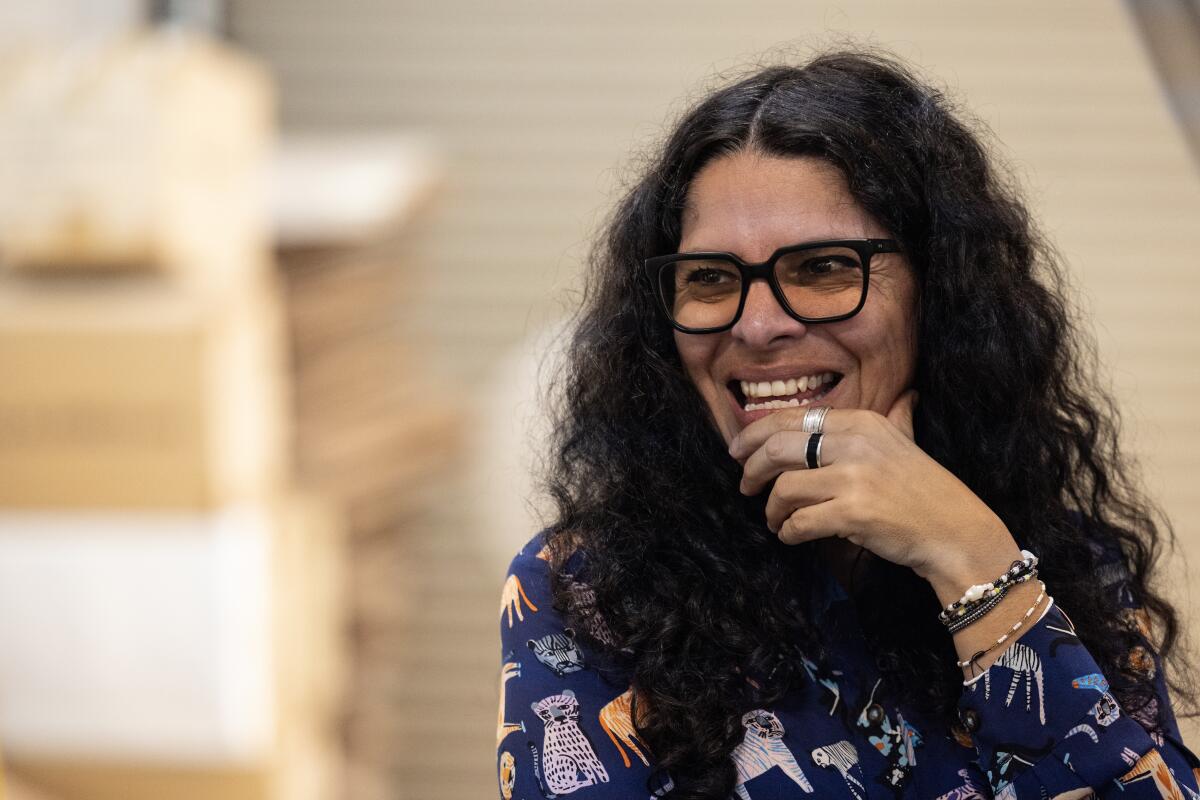
(Etienne Laurent / For The Times)
How do you make it in L.A.?
“It’s so easy to be invisible in this city,” Navarrete told me as we walked toward the back of LA Librería, the brick-and-mortar store she and Arroyo own and run. “It’s so spread out. Promotion is so hard. You have to go community to community, street by street.”
Navarrete and Arroyo knew that success wasn’t guaranteed even in a city with a long Spanish-language literary tradition, a megalopolis where the U.S. Census Bureau estimates that nearly 40% of households speak Spanish. They were preparing to launch in an era when bookstores were closing, Amazon was dominating online sales and the publishing industry was preparing to pivot from paper to digital.
The two were undeterred, however, because of a sense of obligation brought on by disgust. The few children’s books translated from English to Spanish that they could find were riddled with mistakes.
“In English, you don’t publish a book with errors,” Arroyo said. “In Spanish, [American publishers] don’t care. They think that the Spanish-speaking families don’t have money? There’s negative values associated with Spanish.”
“Such tremendous prejudices,” Navarrete added. “When we saw the reality,” opening a store “became a necessity.”
They started with an online bookstore and began to organize school book fairs across the U.S. Next came a warehouse in West Adams that opened to the public in 2015. Soon followed community festivals, contracts with schools to provide bilingual books and increasing fame as one of the few Spanish-language children’s bookstores in the country — and one of the only Spanish-language bookstores in Los Angeles, period.
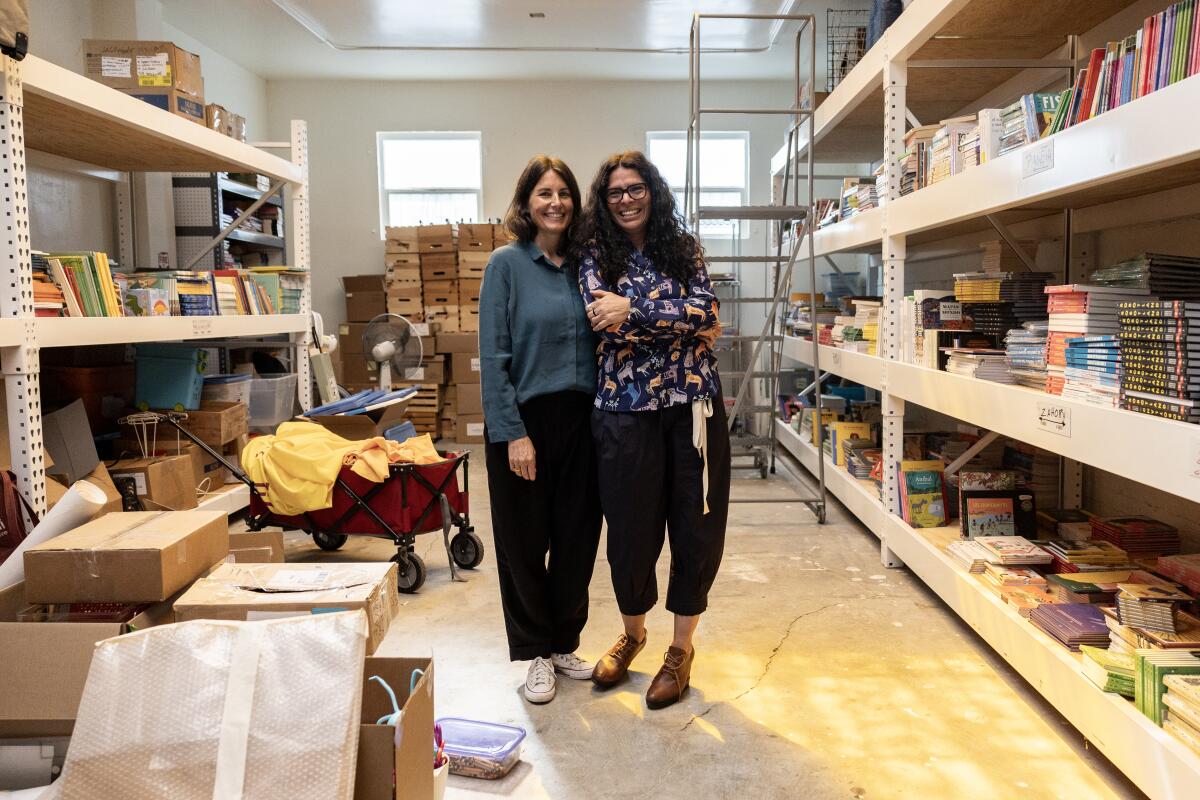
LA Librería co-founders Chiara Arroyo, left, and Celene Navarrete in the stockroom.
(Etienne Laurent / For The Times)
The COVID-19 pandemic nearly ended LA Librería, but Arroyo and Navarrete pulled through with the help of grants and the fact “that children went home with books to read,” according to Navarrete. The store has not only rebounded, but it’s also ready for the next stage of success.
I met Arroyo and Navarrete a few weeks ago at their new location: a long, single-story 4,400-square-foot building in Mid-City that’s double the size of LA Librería’s last spot and that they’ll officially debut in mid-June.
“We’ve asked ourselves if we were crazy many times,” Arroyo, 47, said with a laugh, then a look at Navarrete. They’re both gregarious but not grating and carry conversations with the grace and teamwork of Mookie Betts firing off a throw to Freddie Freeman.
Navarrete, 51, shook her head with a wide grin. “We don’t even believe what we have, because we’re so happy.”
Our tour began in the warehouse section, where 8,000 titles from across the Spanish-speaking world on all sorts of subjects rested in boxes and on huge steel racks better suited for tires. We spoke almost exclusively in Spanish, with me slipping into English a few times even though español was my first tongue. The two were sympathetic.
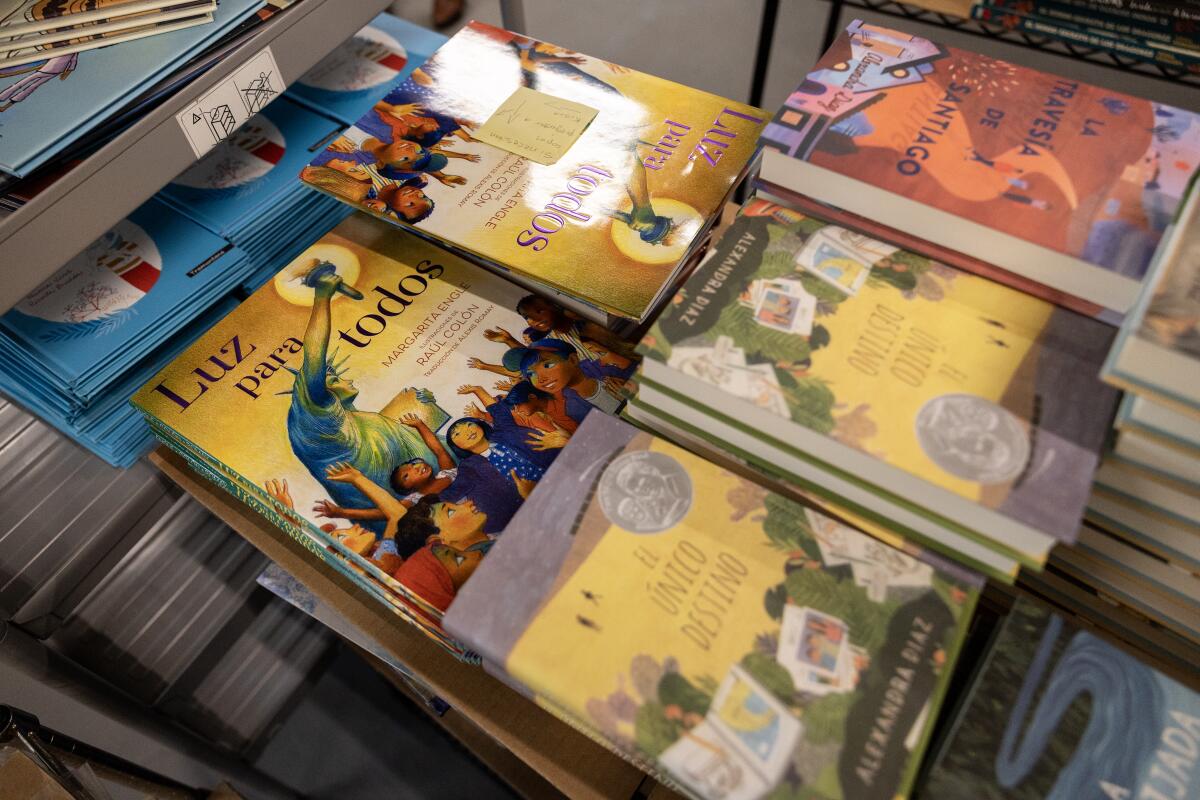
Books are displayed at LA Librería.
(Etienne Laurent / For The Times)
“The interest for bilingualism is here,” said Navarrete, who’s also a professor of coding and computer information systems management at Cal State Dominguez Hills. “It’s changing the importance of keeping Spanish that we need to work on.”
“People want to feel represented,” said Arroyo, a former film critic for Spanish and Mexican publications. “They don’t just ask, ‘Do you have books from Guatemala?’ They ask, ‘Do you have books from Guatemala?’ They want to see themselves.”
Of Spanish and Italian heritage, Arroyo grew up in Barcelona, Spain, where “in every corner, in small towns, there was a bookstore.” Navarrete, a native of the Mexican state of Aguascalientes, was raised in a household where books weren’t as common but were nevertheless treasured. When the two met, they were taken aback by the paucity of Spanish-language literature available in Los Angeles. Festivals and bookstores had come and gone over the decades, done in by lack of funding and the precarious business that is book selling in the digital age.
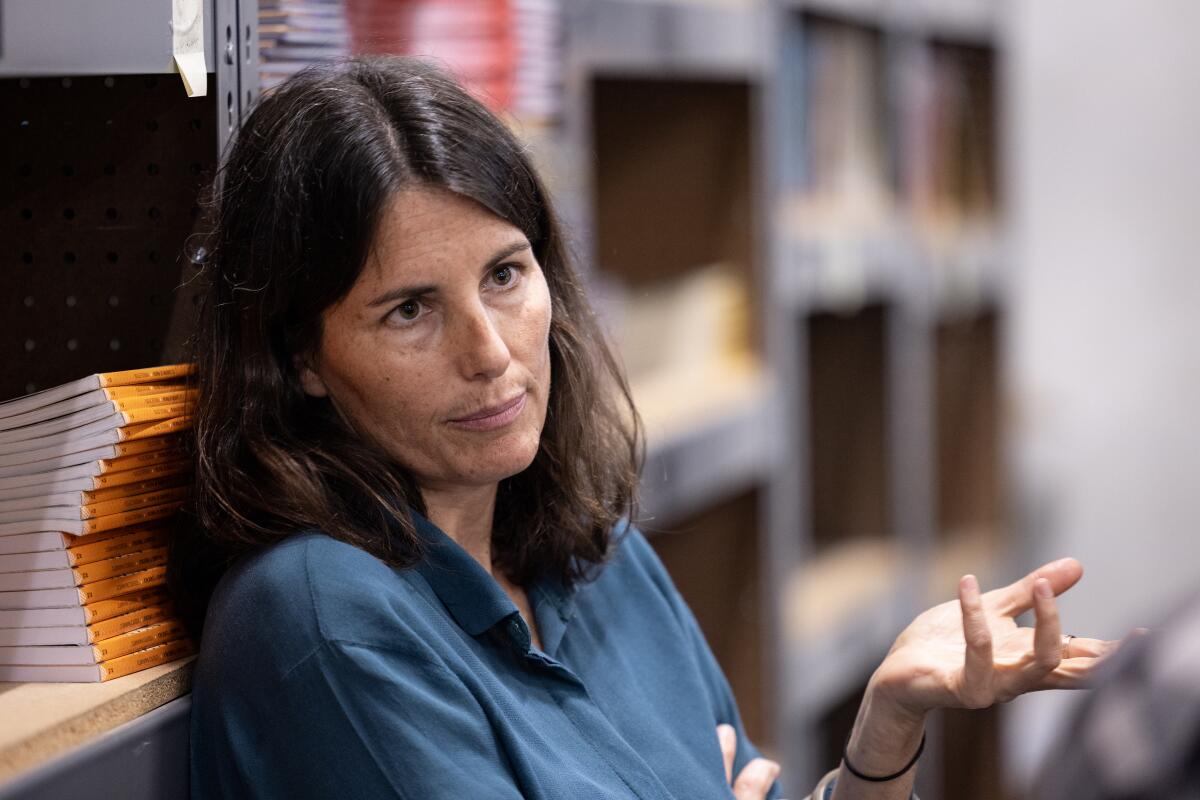
LA Librería co-founder Chiara Arroyo.
(Etienne Laurent / For The Times)
“Spanish has always lived here along English — all kinds of Spanish,” Navarrete said. “But most of what we could find was through Mexican eyes.”
We were now walking around LA Librería’s offices, which double as a packing area. Empty dollies and carts stood near two employees who readied books for delivery. Cool stuff was everywhere I looked. A compendium of Latin American folk tales. A young-adult version of radio legend Maria Hinojosa’s memoir. Picture books teaching Spanish speakers words in Nahuatl and Maya. Above us were giant papier-mâché heads of alebrijes — colorful Mexican folk art figurines — used at LA Librería’s recent appearance at the L.A. Times Festival of Books, where they hosted a signing for me.
“A book in Spanish in this city has a different meaning in this city,” Navarrete said. “A child learns to keep their parents’ language, or just learns it. For immigrant parents or grandparents, the books let them teach a new generation, but also let them remember.”
“It’s a mirror,” Arroyo said. “A portal.”
The two laughed at memories of the early days of LA Librería: How the warehouse began in their homes and moved to their first storefront. How demand soon exceeded supply. How customers quickly asked for readings as well.
“You know Charlie Chaplin?” Arroyo said. “Our first place was like that. We pull this, we move that, and our kitchen turned into a reading space, just like that!”
That won’t be a challenge at LA Libería’s new spot. The tour ended at the front of the store. Wooden planks and plywood sheets waited to be transformed into bookshelves. A glass-encased conference room the two jokingly call “the Fishbowl” will serve as a community gathering space for workshops.
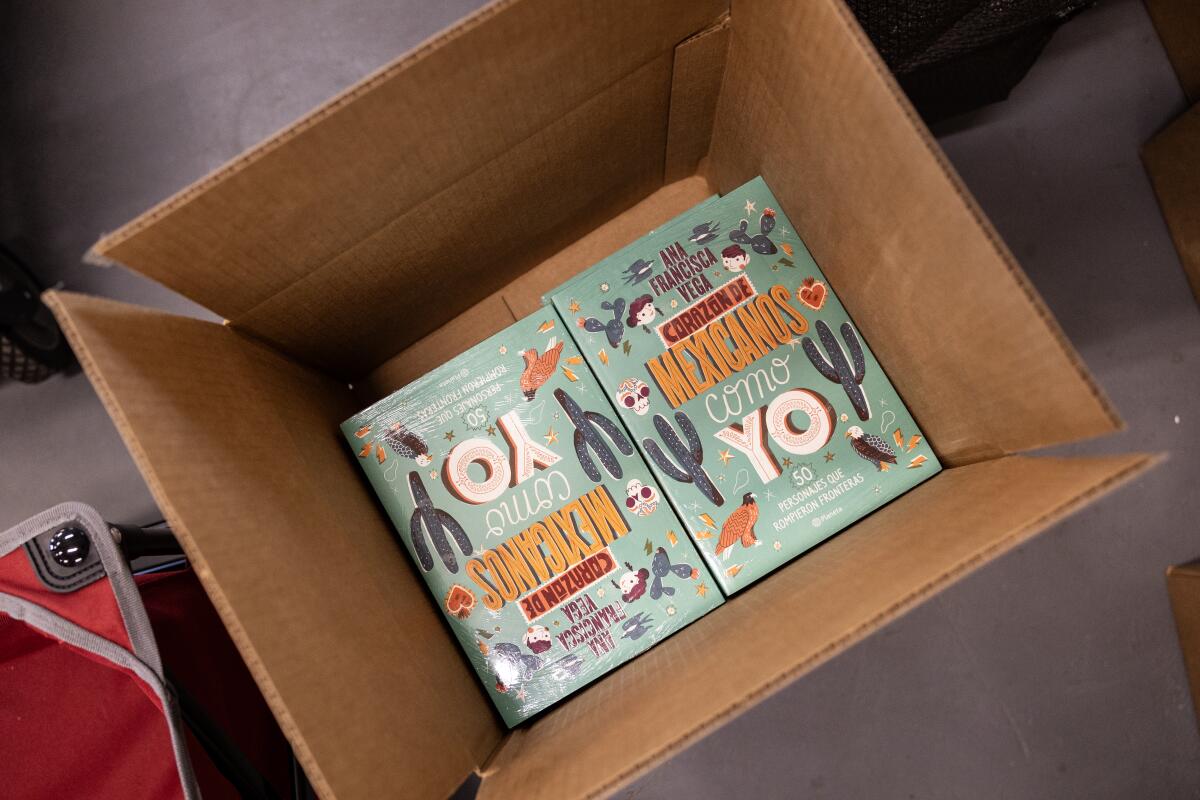
(Etienne Laurent / For The Times)
Once the store opens, it’s time to work on more dreams. Deepening their relationships with L.A.’s other non-English bookstores. Their own publishing house. Expanding the Los Angeles Libros Festival, a bilingual fair they co-founded. Selling more adult books in Spanish.
“We have the kids’ world controlled, but we don’t know the adult world,” Navarrete said. “But pasito a pasito” — little step by little step.
She smiled. “The kids who bought our first books are now in college.”
Arroyo nodded. “Our spouses say we have the stars aligned for us. Maybe they’re right!”
